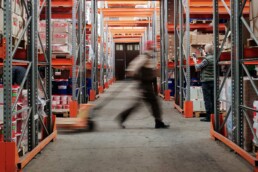Demand Down for Mega Warehouses, Up for Smaller Facilities
The Changing Landscape of 3PL: Bigger is not always better

In recent times, the logistics industry has witnessed a significant shift in warehouse trends. The changing landscape of 3PL is evident throughout the logistics industry. As the demand for e-commerce spaces declines and economic challenges persist, the era of massive warehouses exceeding one million square feet seems to be slowing down. According to a report from CBRE, there has been a 36% decrease in large-facility deals from the first half of 2022 to the same period in 2023. This drop has had an 18% impact on the overall leased industrial space during the first half of the year, aligning with experts’ predictions made in late 2022.
Demand for 3PL surges as e-commerce reduces its footprint amidst market changes
Interestingly, ecommerce companies, which were once major players in the top 100 deals, have experienced a 50% reduction in the number of transactions from January to June 2023 compared to the previous year. The average size of the top 100 industrial lease deals also decreased from 926,683 square feet to 789,471 square feet year over year.
Amid these changes, third-party logistics (3PL) firms have been on the rise, securing a third of the top 100 deals. As many ecommerce companies struggle to manage their own order fulfillment, the demand for reliable and efficient 3PL services has surged. The 3PL sector ranks second, with 34 deals, just behind the general retail and wholesale category, which claimed 34 deals.
When it comes to the most active markets for industrial spaces, Chicago leads the pack with 11 mega-deals totaling 9.6 million square feet. Following closely behind are the I-78/I-81 corridor in Pennsylvania’s Lehigh Valley (9 deals totaling 8.6 million square feet), California’s Inland Empire east of Los Angeles (9 deals totaling 8.1 million square feet), and Dallas/Fort Worth (9 deals totaling 7.3 million square feet).

Warehouse space begins to normalize
The decline in activity this year is attributed to the record-setting growth experienced in 2021 and 2022. With retailers having previously required more extensive and larger warehouses to meet the surge in pandemic-driven consumer demand and store inventory, the current domestic inventory ratios have reached the desired levels, leaving some excess capacity. As a result, leasing activity is now normalizing.
The construction of warehouses of all sizes has also experienced a slowdown due to reduced demand and difficulties in obtaining financing approvals. While smaller facilities under 100,000 square feet near population centers are in high demand, there has been insufficient growth in this segment, leading to soaring rents. The scarcity of space in these locations has driven the need for smaller buildings.
In contrast, the completed projects in the first half of the year set a record in terms of space entering the market, reaching 144.1 million square feet. However, as of June 30, only 43% of this space was occupied, down from 73% in 2022. Larger corporations, retailers, and 3PLs are slowing down the most in leasing activities. Likely due to economic uncertainty and a possible saturation of extreme activities in previous years. These entities appear content with their current warehouse stock.

As logistics evolve so will Falcon Fulfillment
At Falcon Fulfillment we understand the evolving landscape of logistics. We recognize the growing need for a wide range of services to meet the diverse requirements of ecommerce businesses. From order fulfillment solutions, inventory management, and pick and pack services to shipping and delivery, our expertise spans the entire supply chain management process.
With a focus on smaller facilities strategically located, we offer scalable fulfillment solutions that cater to the unique demands of today’s market. Our commitment to order accuracy and quality control, paired with advanced 3PL technology solutions, ensures efficient and reliable services for our clients.
From inbound and outbound logistics to customs brokerage and international shipping, we strive to optimize every aspect of the supply chain. Additionally, our value-added services (VAS), such as kitting and assembly, multi-channel fulfillment, and dropshipping solutions, add versatility and flexibility to our offerings.
As we navigate this ever-changing logistics landscape, we remain dedicated to providing top-notch 3PL services that adapt to the needs of ecommerce businesses. From freight rate negotiation to inventory forecasting, our comprehensive approach ensures a seamless experience for our clients.
As the industry shifts towards a more dynamic and adaptable model, smaller 3PL providers play a vital role in meeting the diverse needs of ecommerce businesses. By leveraging our expertise in warehousing and distribution, fulfillment services, and supply chain optimization, we aim to deliver exceptional results and support the growth of our clients in this rapidly evolving market.




